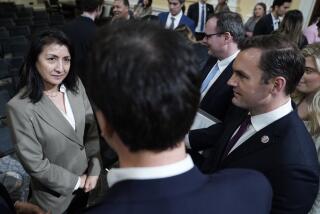Project Has Deng Xiaoping’s Backing : China Calls for Expansion of Market Reforms
- Share via
BEIJING — General Secretary Zhao Ziyang, in a speech reported Sunday by the official New China News Agency, has set the stage for a key meeting of China’s legislature with a call for acceleration of China’s market-oriented reforms.
In the speech, delivered last week to a five-day meeting of the Chinese Communist Party Central Committee, Zhao also revealed that Deng Xiaoping, China’s paramount leader, has strongly endorsed a plan for rapid, export-oriented development of China’s coastal regions.
Zhao, the leading advocate of the plan, said that Deng issued a “recent instruction” that “in carrying out the coastal development strategy we must act boldly, quicken our steps, and not let the opportunity slip by.”
The coastal development plan, which covers regions in which about 200 million people live, apparently has been somewhat controversial within the Chinese leadership. This is partly because it implies tolerance of a growing gap in wealth between China’s more prosperous eastern seaboard and less-developed inland areas.
The statement by Deng--who in recent years has played the role of final arbiter of disagreements--thus can be seen as an attempt to end whatever controversy exists and push the program forward.
A newly selected National People’s Congress, China’s increasingly important legislature, will begin meeting Friday in a session due to last about three weeks. The congress is expected to endorse the coastal development plan and a variety of other reform measures. It also will elect new officials to top government positions.
While strongly advocating deeper reforms, Zhao also pledged to deal with problems that have arisen or are expected to arise in the course of reform.
Zhao acknowledged that the reforms have created new opportunities for corruption. He declared that “grave law-breaking activities, such as abusing one’s power to extort money, graft, embezzlement and betraying the nation’s interests, must be dealt with strongly in accordance with law and discipline,” the news agency reported.
On the coastal development issue, according to the news agency, Zhao “stressed that the implementation of this strategy will facilitate the development of coastal areas, bring along the development of inland areas, and give a great impetus to reforming the systems of foreign trade, science and technology, finance, banking, and pricing.”
Zhao stressed the need for economic ties between the coastal regions and inland provinces to exploit resources in the country’s interior.
Zhao was upbeat about the overall accomplishments of the market-oriented reforms, which began a decade ago and have been gradually expanded.
“Zhao said China may maintain sustained and relatively fast economic growth this year and for a number of years to come if close attention is paid to improving efficiency and ensuring stable and balanced development,” the news agency reported.
Zhao attributed good prospects for development to:
Use of a system under which management of state enterprises is contracted out to individuals who take responsibility for profit and losses.
Rapid growth of rural factories.
International trends in which labor-intensive industries are shifting to countries with low labor costs.
Benefits from participation in international trade.
Improvements in infrastructure, especially in the fields of energy and transportation, over the past few years.
‘Step by Step’
Zhao described inflation, especially in food prices, as a “major problem,” but declared that “the fundamental method to solve the problem of food prices lies in expanding agricultural production.”
Despite troubles with inflation, Zhao said that “. . . irrational prices that impede the growth of production should be readjusted conscientiously and step by step, so that the fluctuation in prices would help rationalize China’s industrial setup and product mix,” the news agency reported.
Zhao also endorsed greater efforts to attract foreign investment.
“We should encourage more foreign businessmen to open wholly-owned enterprises here,” Zhao said. “At the same time, we have to upgrade existing enterprises by establishing more Sino-foreign joint ventures and adopting advanced technology, managerial expertise and sales networks.”
Zhao called for “bold reform of the foreign trade system,” the news agency reported.
“Zhao said that the customs, as well as import and export and foreign exchange administrations, should take the initiative in creating favorable conditions and improving their work style,” the report said.
Zhao also described the broad outlines of a new enterprise law due to be approved by the congress, which will increase the power of factory managers. Managers of state enterprises are to have full authority over their enterprises’ assets, he said.
Opposition Not Tolerated
Communist Party organizations within enterprises “will no longer provide centralized leadership as they did in the past,” according to the report.
Zhao implied that there is top-level concern about public dissatisfaction with some negative effects of reform, the most prominent of which is inflation. He advocated greater openness in party and state affairs to facilitate “carrying out consultations and dialogues among the people” to win public acceptance and avoid mistakes.
Zhao “proposed an early establishment of a spokesman system for the National People’s Congress, the State Council (China’s Cabinet) and its various ministries to offer regular, substantial news briefings,” the news agency reported.
Zhao also indicated that while there should be wide discussion about how best to carry out reform, opposition to reform at the higher levels of government will not be tolerated.
The Communist Party Politburo, according to the news agency’s summary of Zhao’s remarks, “demands that all Communist Party members working in the State Council, especially high-ranking officials, should contribute their bit in the reform.”
More to Read
Sign up for Essential California
The most important California stories and recommendations in your inbox every morning.
You may occasionally receive promotional content from the Los Angeles Times.













